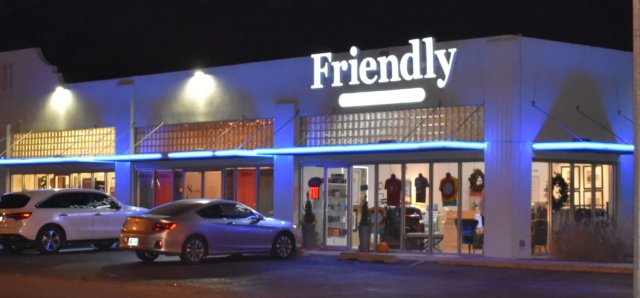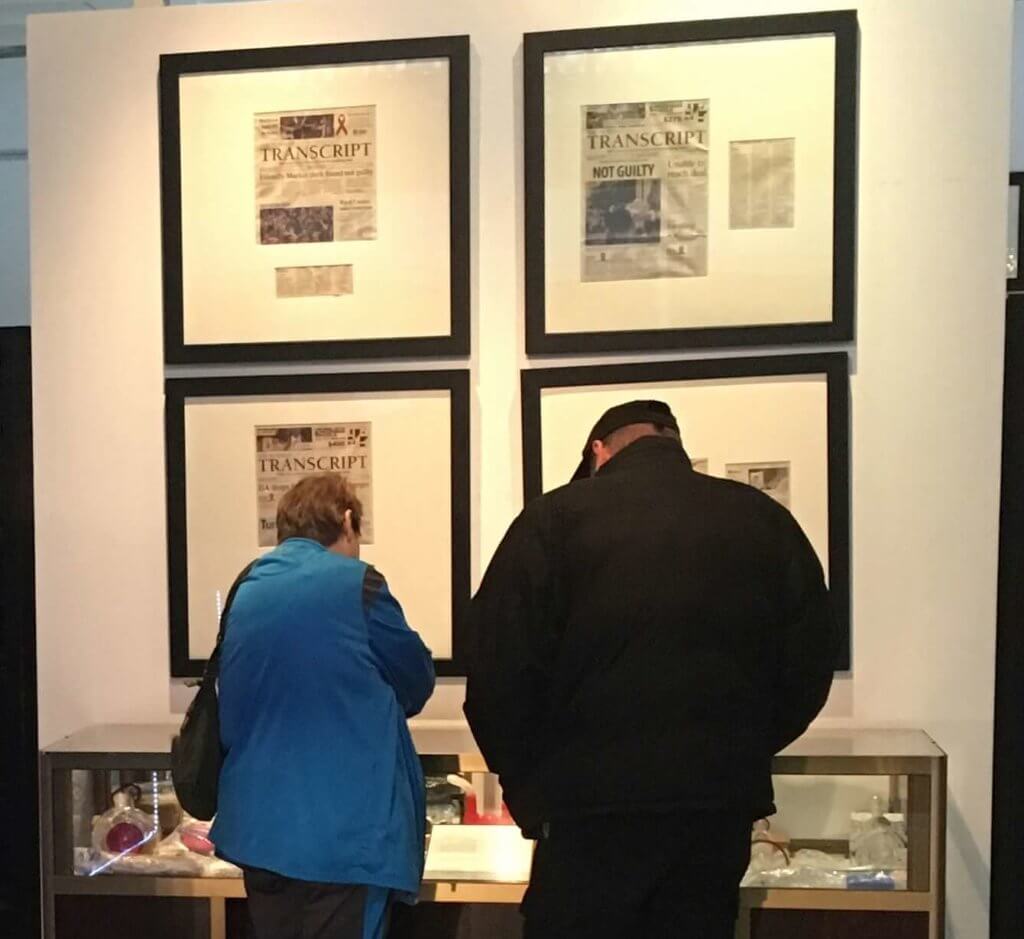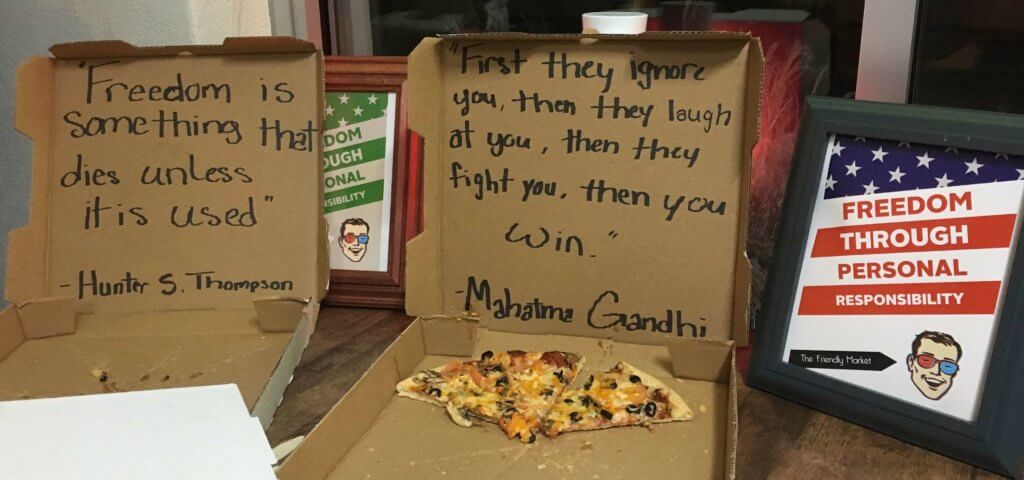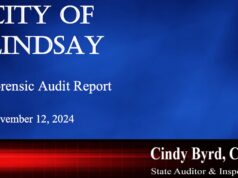

A Norman store selling glass pipes reopened in late October after almost two years of legal battles with Cleveland County and Norman authorities. Its new location on Porter Avenue sits less than one mile from the county courthouse.
The Friendly Market hosted a re-opening party coinciding with the Norman Art Walk on Nov. 10. The turnout shocked Robert Cox, the store’s owner.
“Gratifying. I felt complete gratitude — more gratitude than you could imagine through so many wonderful people coming into the store,” Cox said.
An ode to the store’s perseverance lies at the center of the room.

Newspapers from The Norman Transcript displaying various milestones in Friendly Market’s case are mounted proudly on a central wall. Beneath the papers, a glass case houses nine of the confiscated pipes and various accessories still in their plastic evidence bags.
Throughout the entire event, people stood in front of the exhibit. Some eyes would hover over a headline for a few seconds before finding the next, silently linking the events into a story. The newspaper articles depict a struggle that goes something like this:
On Dec. 1, 2015, Cox watched from the sidewalk as the men marched about his store. Due to the positioning of the window and the layout of the store, he could not see what the men were doing aside from the occasional shuffle. Despite this, the situation was clear. His property was being taken.
He remembers going up to the man barricading the doorway.
“Does your conscience ever bother you when you do things like this?” Cox asked him.
“Nope, I sleep perfectly at night,” Cox said Capt. Tony Riddles of the Norman Police Department dryly responded.
“What in the world are you guys thinking — doing something like this to somebody?” Cox persisted.
“We don’t want marijuana legal,” he said Riddles explained.
The next time Cox would step inside his store, the glass cases that once displayed about 200 to 300 glass pipes would be empty. A cash register that once held about $3,000 would also be empty.
A spokesperson for Cleveland County District Attorney Greg Mashburn declined comment for the office about the Friendly Market’s trials or Norman police raids in general for this story. The case was primarily tried by Assistant District Attorney John Pevehouse.
It all started in 2015
This scene had occurred before.
Cox said that, during an April 2015 raid at former Norman business McCloud’z Pipes and Novelty, police told owner Tamichael McCloud, “Tell your buddy we’re coming for him next,” in regard to Friendly Market.
Upon hearing this, Cox requested and was granted a meeting with the Norman Police Department. He said Norman police detective Rick Newell made it clear that if the pipes were not removed, the Norman Police Department would raid his store and do it themselves.
Cox then removed his entire inventory of glass pipes.
After his McAlester attorneys, Brecken Wagner and Blake Lynch, told him, “Put your pipes back out there. You’re not doing anything illegal,” he complied.
“I really wasn’t concerned about it,” Cox said despite the detective’s warning. He believed three main conditions would protect his store:
First, Judge Joe Heaton ruled that there are multiple purposes for glass pipes in the July 2015 case Ziggy’s v. Lynch, thus implying that a glass pipe is not in and of itself paraphernalia.
Next, in August 2015, Norman City Councilman Stephen Holman said he was told by Jeff Bryant, Norman city attorney, that there was no problem with Holman accepting a job offer from Friendly Market, which he would then go on to accept.
Last and most importantly, the law under Title 63 Section 2-101 in Oklahoma statute states paraphernalia are “materials of any kind which are used or intended for use” with illicit drugs. Without evidence of use or intent, a glass pipe is not drug paraphernalia, as Heaton’s July 2015 ruling had reinforced.
Cox urged his pipes were not for that purpose, and no evidence existed that could say otherwise. The law, his attorneys had explained to him, was on his side.
But its enforcers apparently were not.
“The reason [law enforcement] didn’t think they had to [prove intent] was because no one was ever going to challenge them,” Wagner said.
But somebody did.
Felony, misdemeanor charges follow two raids
About eight months after the warning at McCloud’z, police raided Friendly Market.
The first word out of attorney Wagner’s mouth when Cox called him that evening was a command: “Restock.”
That was on a Monday. By the following Saturday, the store had restocked everything and was open for business.
On Dec. 21, 2015, the second raid occurred. Cox remembers one difference between this raid and the last.
“I didn’t even come down,” he said. “I was just shaking my head.”
The two misdemeanor cases for possession of drug paraphernalia against Max Walters and Cody Franklin, two Friendly Market employees, each lasted three days (Walters’ in October 2016 and Franklin’s in February 2017). The six-day felony case against Holman and Cox occurred in May 2017.
Cases drag on
The defendants would arrive at about 9 a.m. and sit in court, sometimes until 5 p.m. or later each day.
“I have done murders that took less time,” said Wagner, whose McAlester office is more than two hours east of Norman.
Cox said prosecutors introduced evidence, including “the most mundane, monotonous minutiae that you could possibly imagine.”
They described “the interior of the Friendly Market from the moment you walk in the door to the moment you walk all the way around, describing every little detail.”
A few undercover agents came forward with recordings of them buying glass pipes. They would say things like, “I used this money and bought this pipe. Here’s the recording,” Wagner recalled.
One recording caught an agent explaining to the store clerk that he was buying a pipe for his brother-in-law in Alamosa. Wagner said the store clerk was supposed to recognize Alamosa as a small town in Colorado (population roughly 10,000), realize that the agent was hinting that he intended to use the pipe for marijuana and refuse to sell it to the man.
The fact that the clerk failed to do so was evidence of guilt, the prosecutors claimed.
Cleveland County courthouse: ‘A severe example’
Despite Cox’s description of the trial as “monotonous,” events occurred throughout that led Wagner to call Cleveland County “a severe example” of Oklahoma courthouses.
One such instance occurred on the Sunday before the first trial, when The Oklahoman ran a story about the case. Wagner answered a few questions for the story. Before the jury was seated, Wagner was accused of getting The Oklahoman to run the article in order to damage the state’s ability to get a fair jury.
In response, Wagner said the judge told the jury to raise their hands if they had read the story. None did, and the trial proceeded.
Later in that trial, the defendants bought a water pipe from the Funky Munky in McAlester and brought it to the courtroom to show the jury.
“We walked into the courthouse. No one asked us a single question,” Wagner said. “During voir dire, Blake Lynch, my partner, pulls out this big glass pipe and sets it on the podium (…) The DA’s office about fell out of their chairs.
“Eventually, we moved the jury out of the room, and the DA informed us that they might be filing charges against us to have us arrested for possessing paraphernalia and threatened us that if we pulled that out again, we would be arrested in the courtroom.”
This situation ran into the second trial.
Wagner said a prosecutor told Cleveland County Judge Michael Tupper that if the defendants pull out a pipe again, he would have them arrested in front of the jury.
“No one’s getting arrested in my courtroom,” Wagner remembers Tupper responding. “I can’t tell you what to do outside of the courtroom.”
In the first and third trials, the juries deliberated past 5 p.m., the time the courthouse closes.
“Myself and my clients and anyone who supported them were kicked out of the courthouse — the people’s house,” Wagner said.
Meanwhile, the district attorneys, the judge and the jury all remained inside, he said.
“I have practiced in courthouses in the state of Oklahoma, in the state of Missouri, in federal courthouses,” Wagner said. “I’ve never been treated anywhere like I was treated in Cleveland County.”
Charges dropped in June

The jury voted 5-1 for acquittal in Walters’ trial, which resulted in a mistrial, 6-0 in Franklin’s and 12-0 in Holman’s and Cox’s.
Mashburn dropped the remaining charges on June 12, 2017, after discussions with law enforcement and jurors, a press release for the case stated.
“How the Norman Police think they understand the law better than any other city in the state is why this story has become so interesting — and concerning,” Cox said.





















